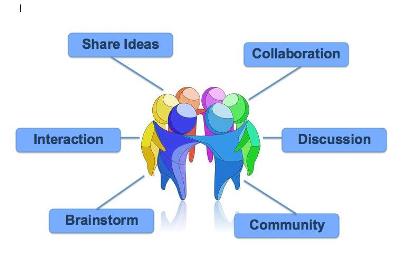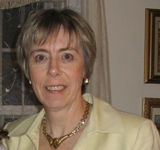|
Preconvention Institutes: Promoting CALL Best Practices

Wikis: Creating Collaborative Learning Spaces
Organizing and facilitating a Preconvention Institute (PCI)
becomes a successful endeavor when collaboration propels the process and
becomes the primary focus. “Wikis: Creating Collaborative Learning
Spaces” provided a learning experience intertwined with collaborative
facilitation and group interaction throughout the process while
incorporating a theme of how technology, specifically wikis, supports
the language learning process through these cooperative
efforts.
Our collaborative team comprised five experienced
professionals: Sandy Wagner, Assistant Professor at the Defense Language
Institute Foreign Language Center, California, USA; Christine
Bauer-Ramazani, Instructor and Teacher Trainer at Saint Michael’s
College, Vermont, USA; Robert “Skip” Gole, Adjunct Professor, Montgomery
College, Maryland, USA; Maria Tomeho-Palermino, Senior Lecturer, Center
for English Language and Orientation Programs, Boston University,
Massachusetts, USA; Jack Watson, Senior Administrator/Facilitator at
University of New Brunswick English Language Programme, New Brunswick,
Canada.
Sixteen participants attended the 4-hour morning workshop held
on 20 March 2013, coming from all parts of the United States, China, the
Middle East, and Canada. Sample collaborative activities introduced and
integrated ways the wiki environment promotes collaboration and moving
from face-to-face to online collaboration. A “getting to know you”
activity required participants to respond to a survey using PollEverywhere.com and
introduce themselves based on their responses to a question about ways
they collaborate in their classrooms. Participants then formed groups to
explore other wiki sites and report back to all in the workshop on
collaborative and interactive features they might use in their teaching
environments. A discussion ensued incorporating Popplet, an online brainstorming
tool that was embedded in the wiki site.
Support for collaboration is evident from the research,
especially as it applies to our ESL learners. Vygotskyian theory
stresses the fundamental role of social interaction in the development
of cognition. Research concludes that collaborative learning “fosters
the development of critical thinking through discussion, clarification
of ideas, and evaluation of others’ ideas.” (Gokhale, 1995).
Additionally, Kessler and Bikowski (2010) state that “collaboration
leads to a sense of ownership that encourages extensive utilization of
the learning space” (p. 55).
Wikis offer support for promoting collaborative learning.
According to Godwin-Jones (2003), Wikis provide a kind of shared
notebook in which all participants may write, edit, compile and catalog
information, negotiate, and perform myriad language functions in an
‘intensively collaborative’ context.
With the advantages of collaborative and cooperative learning
at its core, the workshop provided learners with experiential activities
where they applied learning in the creation of personal wiki sites,
incorporating features and activities that promote the collaborative
process. An additional component involved group discussions and
interactions. A wiki showcase provided a wrap-up of the session as all
participants accessed and explored wikis others had created and left
feedback on a digital form, created and embedded by each participant on
their wiki site. The PCI can be viewed here.
References
Gokhale, A. (1995). Collaborative learning enhances critical
thinking. Journal of Technology Education, 7(1). Retrieved from http://scholar.lib.vt.edu/ejournals/JTE/v7n1/gokhale.jte-v7n1.html
Godwin-Jones, R. (2003). Blogs and wikis: Environments for
on-line collaboration. Language Learning
& Technology, 7(2), 12–16.
Retrieved from http://llt.msu.edu/vol7num2/pdf/emerging.pdf
Kessler, G., & Bikowski, D. (2010). Developing
collaborative autonomous learning abilities in computer mediated
language learning: Attention to meaning among students in wiki space. Computer Assisted Language Learning 23,(1),
41–58.
 Sandy Wagner is Assistant Professor at the Defense
Language Institute Foreign Language Center. She has designed and
facilitated numerous online courses for second language learning and
currently facilitates PP103: Teaching Reading and Writing Online for
TESOL’s Principles and Practices of Online Teaching Certificate Program.
She is also a CALL-IS past chair. Sandy enjoys the beauty of living on
California's Central Coast and spends most of her free time hiking,
camping, and just being outside. She enjoys reading, gourmet cooking,
and local art fairs. Sandy Wagner is Assistant Professor at the Defense
Language Institute Foreign Language Center. She has designed and
facilitated numerous online courses for second language learning and
currently facilitates PP103: Teaching Reading and Writing Online for
TESOL’s Principles and Practices of Online Teaching Certificate Program.
She is also a CALL-IS past chair. Sandy enjoys the beauty of living on
California's Central Coast and spends most of her free time hiking,
camping, and just being outside. She enjoys reading, gourmet cooking,
and local art fairs.
 Christine Bauer-Ramazani is an instructor and teacher
trainer at Saint Michael’s College in Vermont, USA. She cofounded the
Electronic Village Online (EVO) for the CALL-Interest Section and has
authored and taught online courses for TESOL and Saint Michael’s
College, including a graduate course Computer-Assisted Language Learning
Online, which is in its 13th year. Christine enjoys visiting friends
and family in Germany and Iran and playing tennis, kayaking, bicycling,
hiking, x-c skiing, snowshoeing, and baking German cakes in her free
time. Christine Bauer-Ramazani is an instructor and teacher
trainer at Saint Michael’s College in Vermont, USA. She cofounded the
Electronic Village Online (EVO) for the CALL-Interest Section and has
authored and taught online courses for TESOL and Saint Michael’s
College, including a graduate course Computer-Assisted Language Learning
Online, which is in its 13th year. Christine enjoys visiting friends
and family in Germany and Iran and playing tennis, kayaking, bicycling,
hiking, x-c skiing, snowshoeing, and baking German cakes in her free
time.
|

